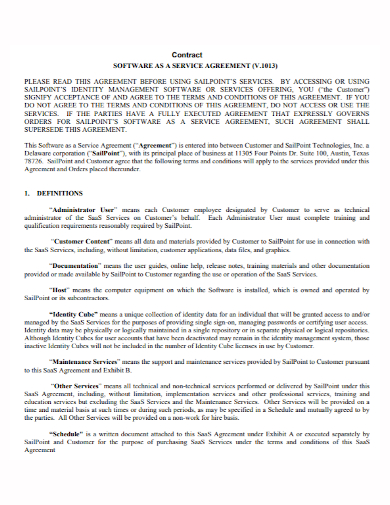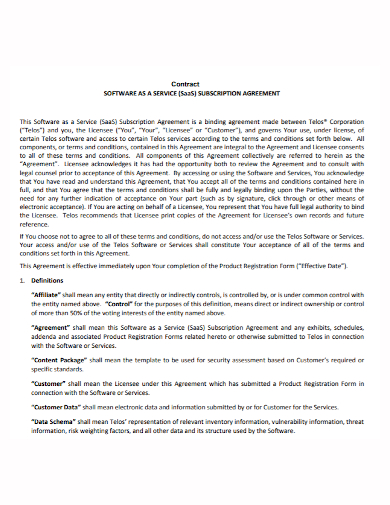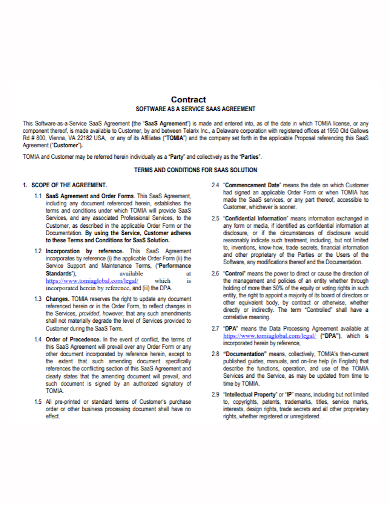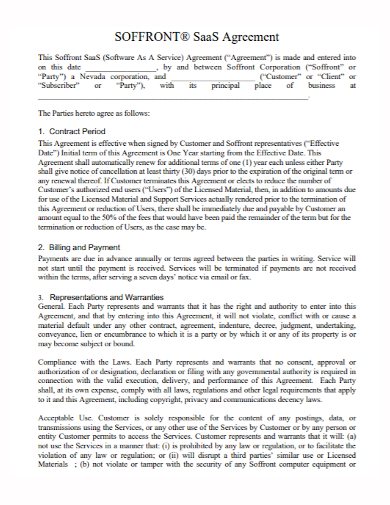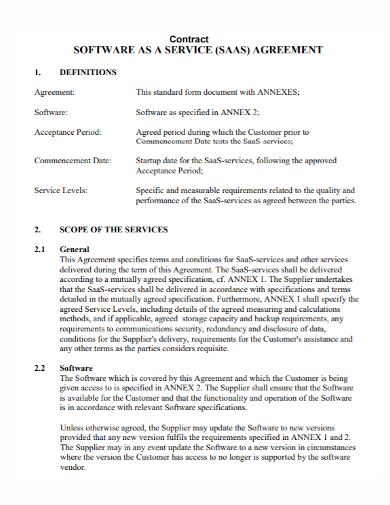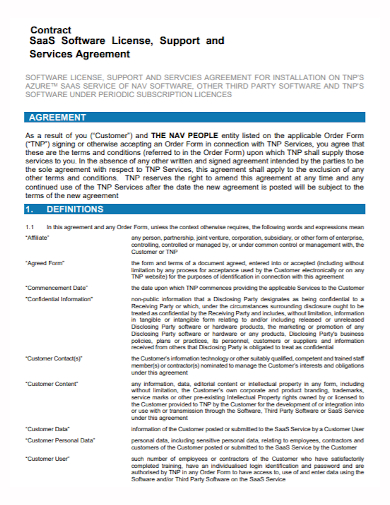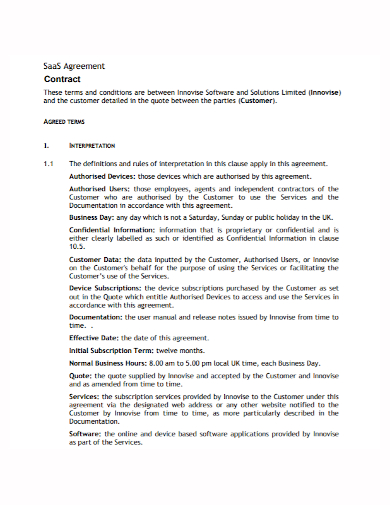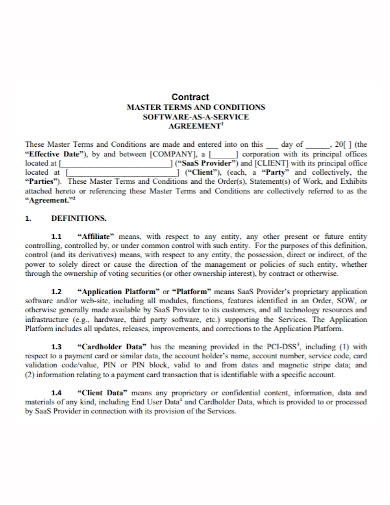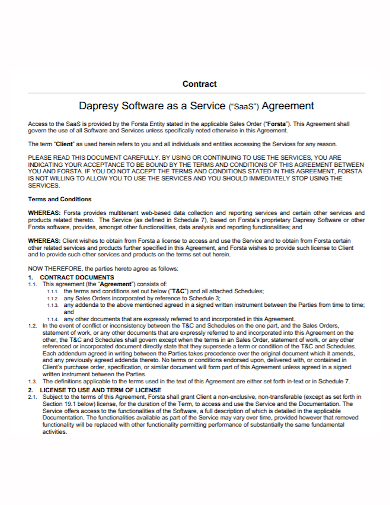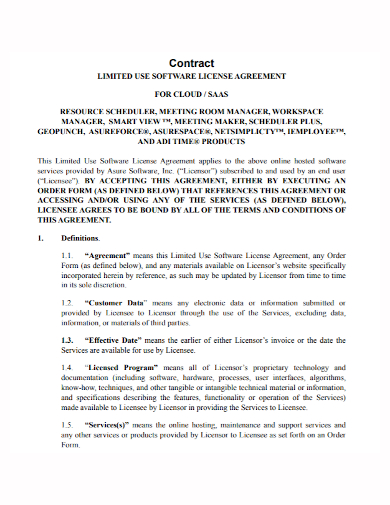It can be intimidating to develop or sign a Software as a Service (SaaS) contract for your company. If you’ve never dealt with a SaaS contract before, they might be tough to comprehend, let alone manage. A SaaS contract is made up of several different components, each of which is essential to safeguard your company’s intellectual property. When a corporation chooses to license software rather than purchase it, SaaS agreements come into play. Unlike the conventional approach, when software was purchased as a whole to a company and installed on servers within their domain, SaaS vendors offer access to software and other services over a public, private, or blended cloud.
10+ SaaS Software Contract Samples
Software as a Service, or SaaS, is a rapidly gaining popularity business model. Instead of offering a one-time installation, SaaS organizations offer software on a subscription basis, frequently with pricing tiers. To maintain their subscription model, these businesses must use particular contracts. A SaaS agreement resembles a licensing agreement. SaaS companies, unlike license agreements, do not offer a tangible product or installation. A SaaS purchase agreement licenses the authority for another enterprise to utilize the software through the cloud rather than giving a physical CD or download. The program can only be used according to the conditions of the customer’s subscription.
1. SaaS Software Contract Template
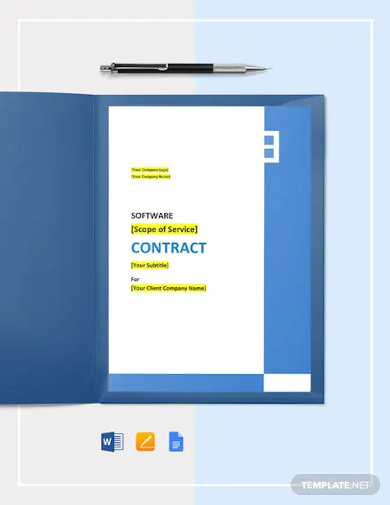
2. SaaS Software Contract
3. SaaS Software Subscription Contract
4. SaaS Software Agreement Contract
5. Sample SaaS Software Contract
6. Standard SaaS Software Contract
7. SaaS Software License Contract
8. SaaS Software Customer Contract
9. SaaS Software Client Contract
10. Professional SaaS Software Contract
11. SaaS Cloud Software Contract
A SaaS contract specifies the software access that clients will have for the duration of their subscription. Many SaaS providers provide many subscription tiers at various price points. Each tier adds additional program functionality or user accounts. The contract specifies the customer’s balanced, their particular rights and duties, and the cost of their subscription.
The corporation whose services are being used is likewise protected by SaaS agreements. They specify how customers are unable to use their license software. They may, for instance, ban the client from sharing it or using it to assist unlawful activity. They may also incorporate liability limitations in the event of a data breach.
Contracts for SaaS services vary depending on the organization and the service. Adobe, for example, offers monthly and yearly memberships. Customers with other Software as a Service contracts can pay as they go, only purchasing for the software they utilize.
When a corporation chooses to license software rather than sell it completely, SaaS agreements are required. Any corporation that intends to license cloud-based software rights must establish terms, limitations, and liability waivers, or risk facing lawsuits and losing revenue.
Multiple SaaS contracts are frequently required by SaaS enterprises. Individual and small business contracts are frequently available, as are specialized enterprise-level solutions.
There are certain limits to SaaS contracts. They can’t shield businesses from all risks.
Let’s say a consumer uses a SaaS service for unlawful purposes, such as drug sales. In that instance, the supplier could potentially be held accountable despite the contract. ?
Clients may also be able to sue the SaaS provider if the company suffers unplanned outages or data breaches. While liability waivers are common in contracts, they may not be recognized in all jurisdictions.
FAQs
What are the components of SaaS contract?
When a corporation chooses to license software rather than purchase it, SaaS agreements come into play. In SaaS agreements, SaaS vendors provide access to software and other technology via a public, private, or hybrid cloud, as opposed to the traditional approach of selling software as a whole to an enterprise and installing it on servers on their premises. In general, SaaS contracts are similar in nature, structure, and obligations, but the specific services, SLA’s, and obligations may vary depending on the type of technology or service.
What is a limitation of liability clause?
A Limitation of Liability agreement shields SaaS vendors from legal liability by legally preventing end-users from seeking certain damages. For example, if the software fails and your business suffers losses, the limitation of liability will limit your ability to recover your losses. It basically consists of a disclaimer and a clause concerning capping the overall amount of damages that a vendor party may be liable for under the agreement.
A smooth SaaS contracting procedure can help your business avoid obstacles and accelerate growth. That’s why establishing a dependable templated workflow for your contracting team is so important. You can cut down on organizational chaos, improve transparency and collaboration, and save time on contract creation.
Related Posts
Sample Excuse Letter for School
Feature Writing Samples
FREE 10+ Security Guard Contract Samples in PDF | MS Word
FREE 10+ Option to Purchase Agreement Samples in MS Word | Apple Pages | PDF
FREE 26+ Curriculum Form Samples in MS Word | PDF
FREE 20+ Cleaning Service Proposal Samples in PDF | MS Word
FREE 29+ Sample Loan Application Form Templates in MS Word | PDF
FREE 10+ Event Venue Contract Samples in PDF | MS Word | Pages | Google Docs
FREE 10+ SBAR Samples in PDF | DOC
FREE 12+ Music Band Contract Templates in PDF | MS Word
FREE 10+ HVAC Maintenance Contract Samples in PDF | MS Word
FREE 10+ Social Media Marketing Contract Samples in MS Word | PDF
FREE 10+ Wholesale Assignment Contract Samples in PDF
FREE 18+ Financial Proposal Samples in PDF | MS Word | Google Docs | Pages
FREE 10+ Feasibility Study Samples in PDF

